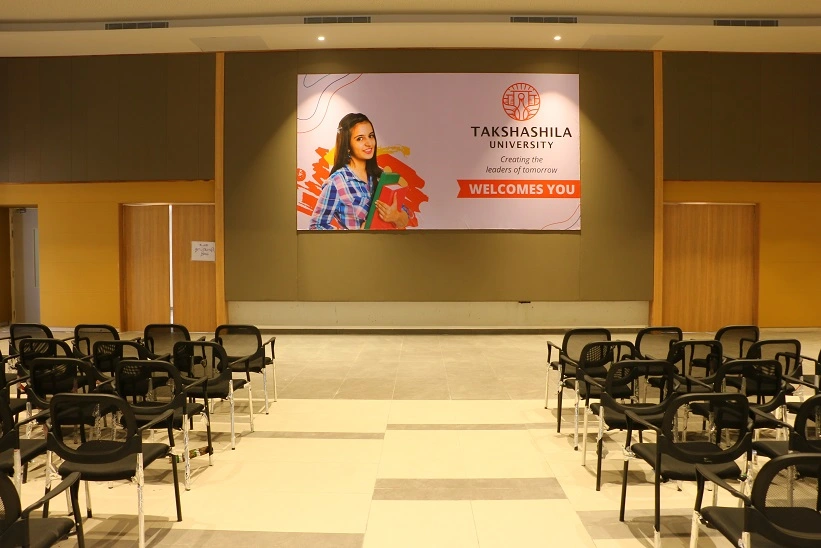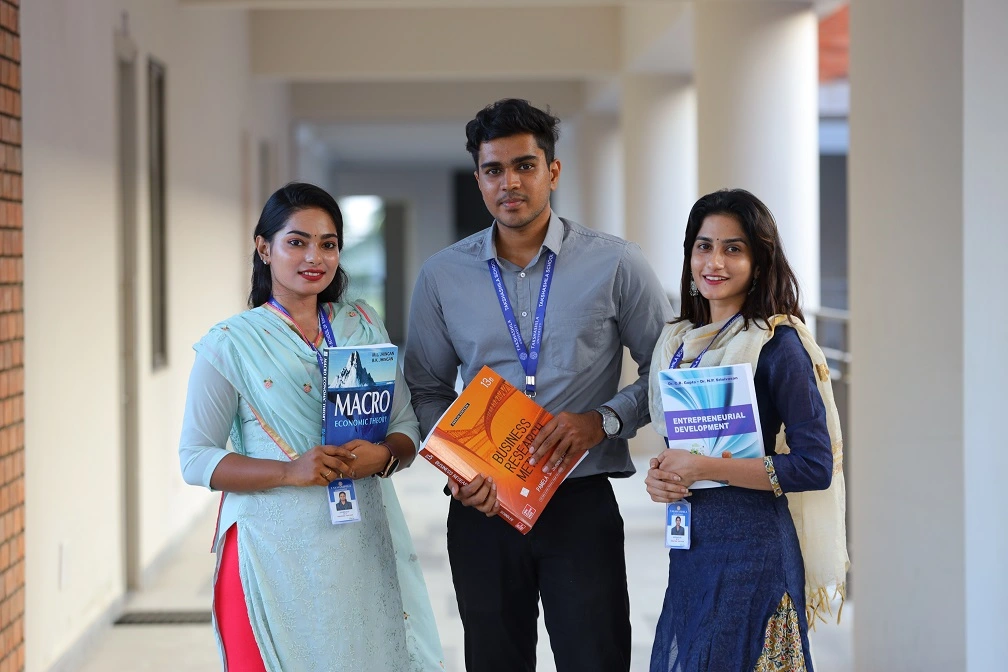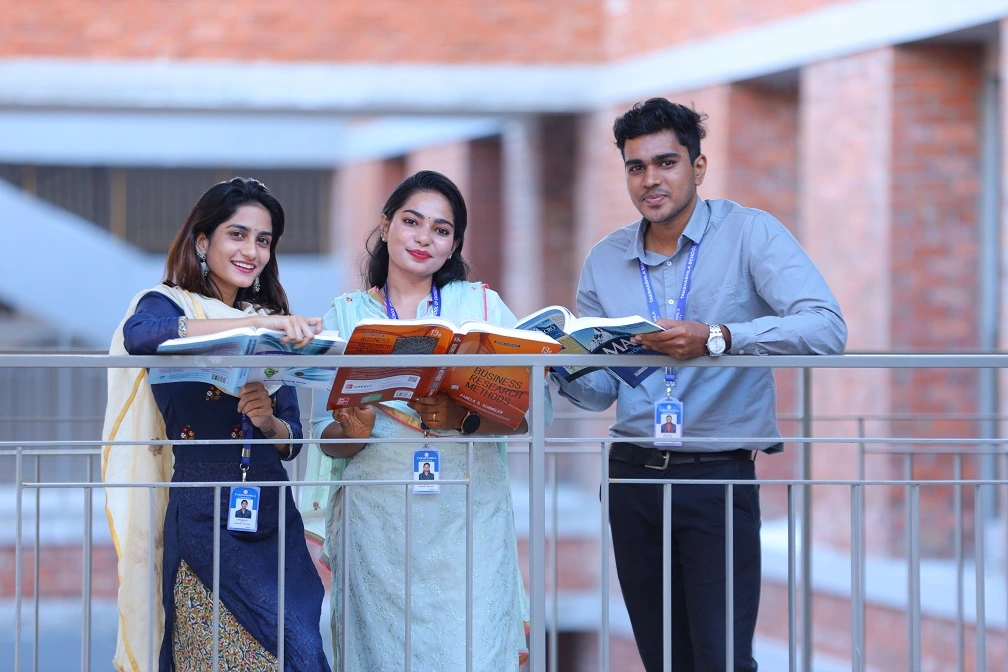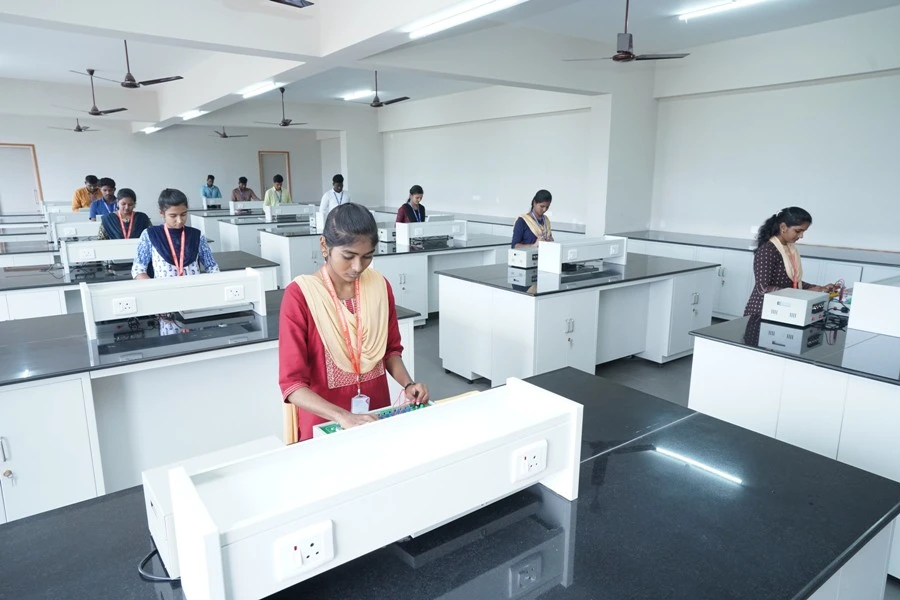Ph.D English
- Hands-on Training
- Faculty with International Experience
- Advanced Curriculum
- Upto 100% Scholarship based on merit

About the Course
The Ph.D. in English at Takshashila University offers a rigorous academic journey into the realms of literature, language, and critical theory. Designed for aspiring scholars, the programme encourages original research and deep intellectual engagement across areas such as literary theory, comparative literature, postcolonial studies, cultural studies, and more.
With guidance from experienced faculty, students will explore diverse texts, contexts, and interpretations while contributing meaningful scholarship to the field. This doctorate is ideal for those passionate about literature and eager to pursue careers in academia, publishing, research, and related fields requiring advanced analytical and communication skills.
Course Curriculum

Year 1: Coursework and Research Foundations
The first year focuses on building a strong academic and research foundation in English Studies. You will engage with core theoretical frameworks and advanced literary analysis across genres and periods. This year introduces various critical approaches, literary theory, and research methodologies necessary for doctoral-level work. You will also begin identifying your area of research and prepare your synopsis for further study.
Key Subjects: Research Methodology, Literary Theory and Criticism, Trends in Contemporary Literature, Comparative Literature, Academic Writing and Publication Ethics.
Year 2: Specialisation and Proposal Development
In the second year, you will dive deeper into your chosen area of specialisation—be it postcolonial literature, cultural studies, gender studies, or digital humanities. You’ll conduct comprehensive literature reviews and begin writing your research proposal under the guidance of a supervisor. Peer discussions, seminars, and interdisciplinary perspectives enrich your understanding during this phase.
Key Focus Areas: Specialised Reading Seminars, Comparative Textual Analysis, Research Proposal Development, Academic Presentations, Interdisciplinary Study Modules.
Year 3 and Beyond: Research and Dissertation
From the third year onwards, the focus shifts entirely to independent research and dissertation writing. You’ll contribute original thought to the field, participate in national/international conferences, and prepare your thesis for submission and defense.
Key Components: Field Research (if applicable), Data Collection & Analysis, Thesis Writing, Pre-Submission Seminars, Viva Voce Preparation.
Programme Outcomes (POEs)
Upon completing the Ph.D. in English at Takshashila University, you will emerge as a highly skilled scholar, researcher, and critical thinker with expertise in literary studies, cultural analysis, and academic writing. The programme equips you with the following competencies:
Advanced Research Skills
You will develop the ability to conduct original, independent research using appropriate literary theories and methodologies, contributing new knowledge to the field of English studies.
Scholarly Communication
You will master the art of academic writing, publishing in peer-reviewed journals, presenting at conferences, and engaging in meaningful scholarly debates.
Critical and Analytical Thinking
Through intensive textual and theoretical study, you will enhance your ability to critically evaluate texts, concepts, and cultural phenomena from diverse perspectives.
Interdisciplinary Expertise
You will learn to draw from history, philosophy, politics, sociology, and media studies to enrich your literary research, making your work relevant across multiple academic disciplines.
Pedagogical Skills
You will be prepared to design and deliver undergraduate or postgraduate courses in English, contributing effectively to academic institutions.
Ethical and Responsible Research Practice
You will adhere to academic integrity, ensuring ethical conduct in your research, data collection, citation practices, and scholarly publishing.
Programme Outcomes (POs)
The Ph.D. in English programme at Takshashila University is designed to foster deep intellectual growth and academic excellence. Upon completion, you will achieve the following broader learning outcomes:
PO1: Advanced Knowledge in Literary and Cultural Studies
You will acquire a profound understanding of English literature, critical theories, comparative literature, and cultural studies, allowing you to engage with texts and contexts across historical and geographical boundaries.
PO2: Independent Research and Scholarly Contribution
You will be equipped to undertake rigorous independent research that contributes original insights to the field of English studies, with the potential for national and international recognition through publications and conferences.
PO3: Critical Thinking and Theoretical Application
You will refine your analytical and interpretative skills, enabling you to apply complex literary theories to texts and cultural phenomena, and engage in meaningful critique and scholarly debate.
PO4: Academic Writing and Communication
You will master academic writing and communication, producing well-structured theses, journal articles, and scholarly content that meet global academic standards.
PO5: Interdisciplinary and Ethical Research Approach
You will develop the ability to integrate interdisciplinary perspectives into your work, while adhering to ethical standards in research, citations, and academic practice.
PO6: Teaching and Mentoring Skills
You will gain the pedagogical expertise needed to teach literature, language, and theory effectively at undergraduate and postgraduate levels, while mentoring future scholars in the field.
Programme Specific Outcomes (PSOs)
The Programme Specific Outcomes (PSOs) define the specialised scholarly and professional competencies you will develop during the Ph.D. in English programme at Takshashila University, enabling you to excel in academia, research, and interdisciplinary studies.
PSO1: Expertise in Literary Theory and Critical Analysis
You will gain in-depth proficiency in applying literary and cultural theories such as postcolonialism, feminism, structuralism, and psychoanalysis to texts, enabling nuanced analysis and critical discourse in English studies.
PSO2: Specialisation in Comparative and World Literature
You will develop the ability to compare literary texts across cultures, languages, and periods, enhancing your understanding of global literary traditions and their socio-political contexts.
PSO3: Proficiency in Research Methodology
You will be trained in advanced research methods, including qualitative and quantitative approaches, bibliographic techniques, and the use of digital tools in humanities research, ensuring academic rigor and innovation in your scholarly work.
PSO4: Interdisciplinary Engagement and Application
You will explore intersections between literature and disciplines such as history, philosophy, gender studies, media, and linguistics, enabling cross-disciplinary research and enriched academic perspectives.
PSO5: Academic Publication and Conference Presentation
You will be equipped to publish research papers in reputed journals and present at national and international conferences, building a strong academic profile and contributing to the global scholarly community.
PSO6: Capacity for Academic Leadership and Curriculum Design
You will develop the skills required for curriculum planning, academic mentorship, and departmental leadership, preparing you for roles in higher education institutions and research organisations.
Career Scope
Completing a Ph.D. in English opens the door to a wide range of academic, research, and professional opportunities in both national and international contexts. As a doctoral graduate, you will be well-prepared to take on leadership roles in academia, publishing, media, public policy, and cultural organisations.
Assistant Professor / Associate Professor
- Role: Teaching undergraduate and postgraduate students, supervising research, publishing scholarly work, and contributing to curriculum development in universities and colleges.
- Salary: ₹6,00,000 to ₹12,00,000 per annum (based on institution, experience, and qualifications).
Research Scholar / Postdoctoral Fellow
- Role: Conducting independent or collaborative research in literary studies, cultural theory, or interdisciplinary fields; publishing papers; participating in academic projects.
- Salary: ₹4,00,000 to ₹9,00,000 per annum (varies by fellowship or institution).
Content Head / Editorial Lead
- Role: Overseeing editorial content, managing teams of writers, ensuring content quality across publishing houses, digital media, or corporate communications.
- Salary: ₹5,00,000 to ₹10,00,000 per annum.
Curriculum Developer / Education Consultant
- Role: Designing and reviewing academic curricula, especially for humanities programmes; advising educational institutions on pedagogy and content.
- Salary: ₹4,00,000 to ₹8,00,000 per annum.
Literary Critic / Writer
- Role: Writing book reviews, essays, and scholarly articles for journals, newspapers, or online platforms; contributing to cultural commentary.
- Salary: ₹3,00,000 to ₹7,00,000 per annum (freelance or full-time).
Policy Analyst / NGO Specialist
- Role: Conducting research and preparing reports on language, education, or cultural policy for government agencies or non-profits.
- Salary: ₹4,00,000 to ₹8,00,000 per annum.
Language Specialist / Translator
- Role: Translating literary and academic texts, interpreting across languages, or working as a language consultant in publishing or MNCs.
- Salary: ₹3,50,000 to ₹6,00,000 per annum.
Cultural Programme Manager
- Role: Planning and managing events, exhibitions, and public humanities programmes in cultural institutions or embassies.
- Salary: ₹4,00,000 to ₹7,00,000 per annum.
A Ph.D. in English not only prepares you for academia but also empowers you to take on dynamic roles in a global knowledge-driven economy, where communication, research, and critical inquiry are key assets.
What You Will Gain at Takshashila University

At Takshashila University, pursuing a Ph.D. in English offers a transformative academic journey that empowers you to become a thought leader in literature, language, and cultural studies. Here’s how we help you thrive:
Rigorous and Research-Driven Curriculum
Our Ph.D. programme is designed to deepen your critical engagement with literature, theory, and interdisciplinary studies. You will develop advanced research skills, explore emerging areas in literary scholarship, and contribute original insights through your doctoral thesis.
Individual Mentorship from Expert Faculty
You will benefit from personalised mentorship from experienced scholars in diverse literary fields. One-on-one guidance ensures your research stays on track and meets the highest academic standards, while also encouraging intellectual independence and creativity.
Academic Exposure and Publication Support
We actively encourage participation in conferences, seminars, and journal publications. You will gain exposure to national and international academic platforms, giving your research visibility and helping you build a strong academic portfolio.
Collaborative Learning Environment
Takshashila University fosters a dynamic scholarly community where ideas are exchanged freely. You will be part of a cohort that supports peer learning, interdisciplinary dialogue, and collaborative research initiatives.
Access to Resources and Research Tools
From a well-equipped library to access to digital archives and databases, you’ll have the resources needed for in-depth research. Training in academic writing, citation methods, and research methodology further strengthens your scholarly capabilities.
At Takshashila University, pursuing a Ph.D. in English offers a transformative academic journey that empowers you to become a thought leader in literature, language, and cultural studies. Here’s how we help you thrive:

To apply for the Ph.D. in English programme at Takshashila University, candidates must fulfil the following criteria:
- Academic Qualification: Applicants must have a Master’s degree in English, English Literature, Comparative Literature, or a closely related discipline from a recognised university.
- Minimum Marks: A minimum of 55% aggregate marks (or equivalent grade) in the postgraduate degree is required. A relaxation of 5% is applicable for candidates belonging to reserved categories, as per UGC norms.
- Entrance Exam/Interview: Candidates must qualify in the university’s Ph.D. entrance examination or hold a valid UGC-NET/JRF score. Shortlisted candidates will be invited for a personal interview to evaluate research aptitude and subject knowledge.
Please refer to the university’s official admissions page for updated details and important deadlines for the current academic year.

For All Programmes except MBA, MCA, M.Tech, and Integrated Programmes offered by Sunstone, FacePrep, Kalvium and NxtWave
|
S.No |
% of Marks |
Scholarship Amount in Tuition Fees per year |
|
1 |
60% – 75% |
10% |
|
2 |
Above 75 % – 90 % |
25 % |
|
3 |
Above 90 % |
50 % |
Calculation of percentage of Marks (+2 of HSC / 2nd Year of APBIM or +2 of CBSE or Equivalent)
- Engineering – Average marks in Mathematics, Physics, Chemistry/Computer Science
- Lateral Entry – Average marks in Diploma Programme.
- Agriculture – Average marks in Physics, Chemistry, Biology / Botany &Zoology
- AHS / BPT / Pharmacy – Average marks in Physics, Chemistry, Biology / Botany &Zoology/Bio Tech
- UG – Arts & Science / Hotel Management – Overall +2 marks – (+2 of HSC / 2nd Year of APBIM or +2 of CBSE or Equivalent)
- PG – Overall % in UG
- Diploma – Average mark in 10th /Equivalent
MBA, MCA, M. Tech, and Integrated Programmes offered by Sunstone, FacePrep, Kalvium and NxtWave – No Academic Scholarship applicable.
Experience Beyond the Classroom
At Takshashila University, the Ph.D. journey in English is not limited to academic research, it’s an immersive experience that encourages intellectual growth, creative exploration and meaningful engagement. The university offers an enriching environment where scholars thrive both inside and beyond the classroom.
What you can look forward to

Research-Centric Environment
Access dedicated research hubs, well-stocked libraries, and interdisciplinary forums that support your scholarly pursuits and enable in-depth exploration of literature, culture, language, and theory.

Collaborative Learning Culture
Engage in seminars, workshops, and peer discussion forums where you can present your research, receive feedback, and build academic collaborations within and beyond your discipline.

Faculty Mentorship & Academic Freedom
Benefit from close mentorship by experienced faculty who guide you in shaping your research while encouraging independent thinking and academic integrity.

Academic Events & Conferences
Participate in national and international conferences, guest lectures, and symposiums that keep you connected with the latest trends, debates, and innovations in English studies.
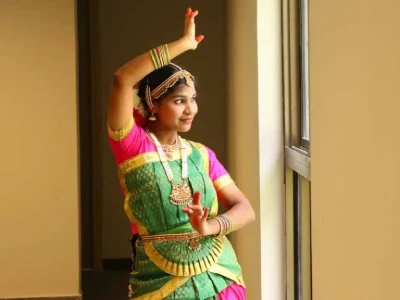
Dynamic Campus Life
Join literary clubs, debates, theatre groups, and cultural societies that enrich your student experience and help you develop communication, leadership, and networking skills.
Spread over 150 acres
At Takshashila University, you will have ample opportunities to hone your skills in real-world healthcare settings, utilising state-of-the-art medical facilities and simulation labs on our 150-acre campus.
Ready to pursue advanced research and shape the future of literary studies?
Frequently Asked Questions (FAQs)
What is the duration of the Ph.D. in English programme at Takshashila University?
The Ph.D. in English typically takes a minimum of three years to complete, including coursework, research, and dissertation submission. The duration may extend depending on the nature of research and university guidelines.
What are the eligibility criteria for applying to the Ph.D. in English programme?
Applicants must hold a Master’s degree in English or a related discipline with a minimum of 55% aggregate marks. Candidates from reserved categories may be eligible for a relaxation in marks as per UGC norms.
Is there an entrance exam or interview for admission?
Yes. Admission is based on a written entrance examination followed by a personal interview. Candidates who have qualified UGC-NET/JRF or equivalent national-level tests may be exempted from the entrance exam.
What areas of research can I pursue during the Ph.D.?
You can explore a wide range of areas including British Literature, American Literature, Indian Writing in English, Literary Theory, Cultural Studies, Gender Studies, Postcolonial Literature, and more. You’ll finalise your topic in consultation with your research supervisor.
What career opportunities are available after completing a Ph.D. in English?
Graduates can pursue careers as university professors, academic researchers, content strategists, editors, literary critics, policy analysts, and more. The degree also opens doors to international academic and publishing opportunities.

